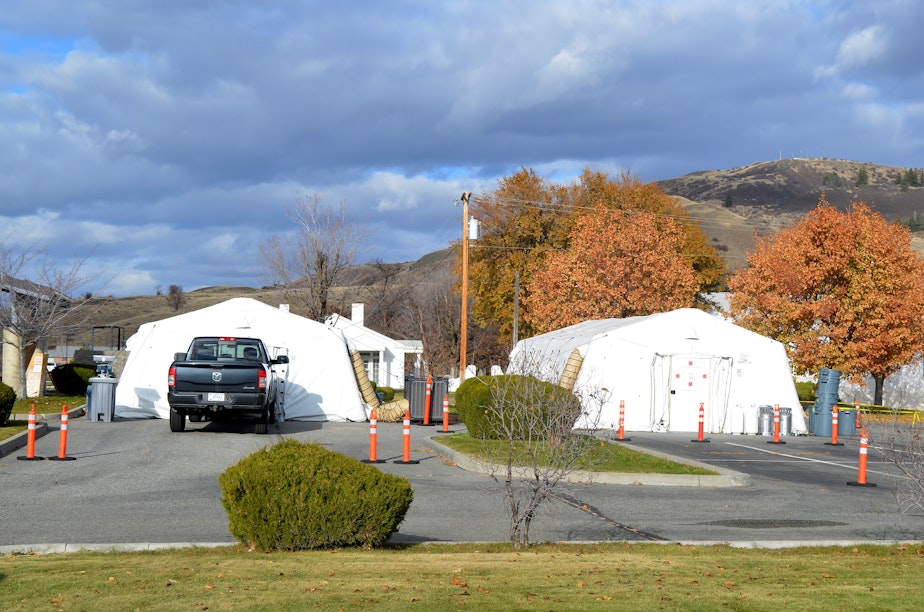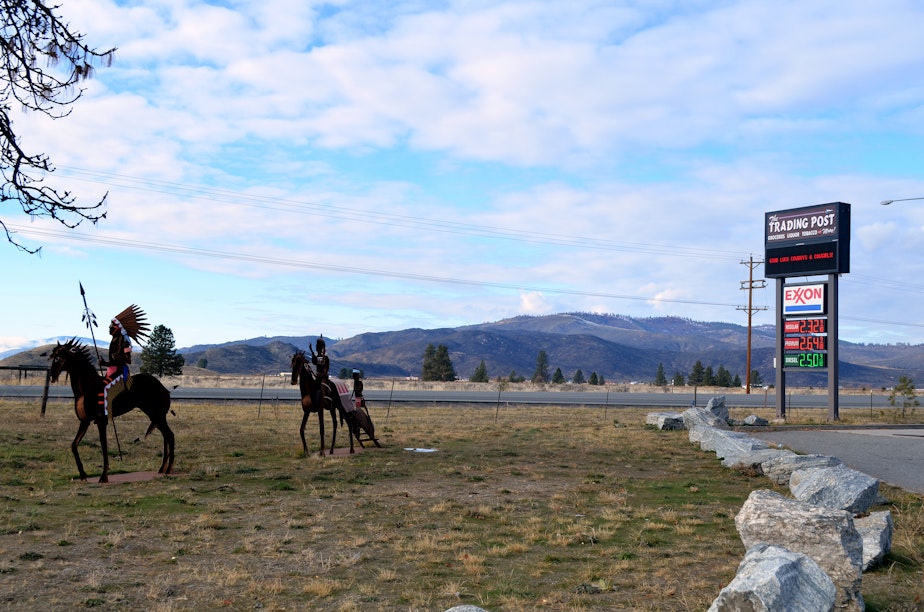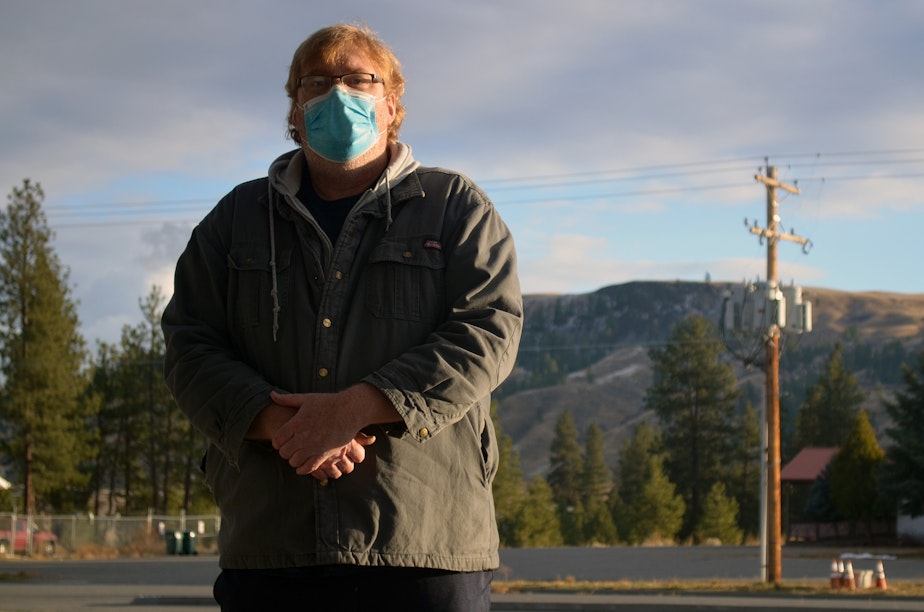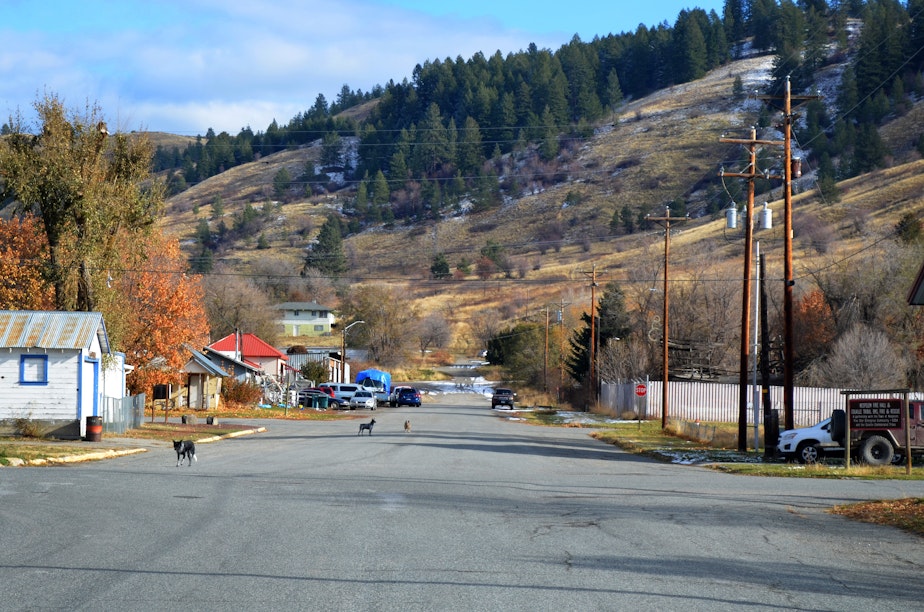A rural tribe tried to keep Covid at bay, but a last hurrah seeded an outbreak
The town of Nespelem, on the Colville Reservation, is about a dozen city blocks surrounded by hills speckled with snow in mid-November.
Gary Carden has owned and managed the town’s only tavern for about 25 years.
When I drove up, Carden, 63, was waiting on a La-Z-Boy recliner on the tavern’s concrete front porch, with his dogs Sissy and Harold.
"She’s the older dog, and that’s probably the best thing that happened to her is finding her a small buddy, 'cause he’s so active and keeps her active," he told me.
Last June, Carden was sitting inside the tavern, by the wood stove that heats the place through the cold winters.
He’s normally active, not just running the tavern but riding horses and motorcycles — but on this particular June day, he felt out of breath and exhausted.
"My sister came walking in," Carden told me, "and she says, 'God, brother, you don't look good. Do you want me to call the ambulance?'" He replied, "Yeah, I think you better. There's something wrong."
Sponsored
Carden said he thought he had heat exhaustion — he had spent the day splitting wood with his nephew.
But it was Covid.
Since early March, the Colville tribal council has been doing their best to insulate their community in north-central Washington.
They arranged for meals to be dropped off at the homes of tribal elders. They closed the reservation to non-essential travel. And, when members tested positive for Covid, the council helped them isolate themselves from their families by providing portable toilets, mobile homes, and even hotel rooms as needed.
But borders are fluid, so even the tribe’s extensive precautions haven’t been enough to fully protect Colville members.
Sponsored
Despite all the steps the tribe took to keep Covid at bay, the reservation has had two big outbreaks: one in the summer, and one that’s happening right now.
"We got hit so hard," said Larry Smith, a doctor on the reservation who runs two of its four clinics.
Smith said the tribe set up large tents at the very beginning of the pandemic, so health providers would have a place to treat Covid patients and to don protective gear before administering Covid tests.

He said part of the reason it was important to him to prevent outbreaks was that so many of his patients are at risk of bad outcomes if they contract Covid-19.
Sponsored
"Probably 80 percent of the people that I see have some risk factors — whether it’s hypertension, diabetes, or autoimmune disease," Smith said.
Between the two big outbreaks and a steady trickle of cases, about 300 people on the Colville Reservation have had Covid. Three have died of it. That’s a big hit for a small community — the Covid rate there is more than double the rate in King County.
Sponsored
Carden, the tavern owner, caught the virus during the first wave. When he tested positive, his doctor sent him to a hospital in Wenatchee about 100 miles away. He spent a week on a ventilator and more time in the ICU.
He said the hardest part was the isolation.
"I was even ready to give up," Carden said. "I even told them doctors, you know, 'Hey, I quit. Pull these tubes out.'"
Both big outbreaks on the Colville Reservation happened when case numbers were way up in surrounding communities.
Joel Boyd, the vice-chair of the Colville Tribal Council, said, when the virus is so prevalent all around the reservation, it’s just hard to keep it out.
Sponsored
"One of the biggest things that bothers people here on the reservation," he said, is that, "when you do go off-reservation, ... there’s communities that almost pride themselves on not wearing masks, and it’s a serious danger.”
Boyd said both outbreaks came from tribal members going places or visiting family or friends — or receiving outside visitors.

Sponsored
The current outbreak was seeded when a group of 10 or so people from the Colville Reservation visited a bar or restaurant in a nearby town. That was in mid-November, right before Governor Jay Inslee re-closed all indoor dining in the state.
"It was the last weekend for these restaurants and bars to be open before the governor had closed them," Boyd remembered. "And so it was a packed location at the time, just because everyone was getting in their last little hurrah I guess you would call it. And unfortunately, that was all it took for us to get a nice little outbreak."
Boyd said, once one person on the reservation gets Covid, it’s hard to stem the spread, because so many tribal members live in multi-generational households.
"Once one family member gets it, there could be six other family members that end up being infected as well," he said. "It's hard to say where those other five people have gone or — it spreads so rapidly."
Take the current outbreak, in a part of the reservation called Inchelium.
"In Inchelium, we had under 10 cases, and, in a matter of two days, we had over 40 cases," Boyd said.
Now, nearly a quarter of the 500 people in that small community have either tested positive or are quarantined, awaiting results.

Boyd said, during this outbreak, the tribal council took a new step it hadn’t tried last time to try to keep the virus from spreading too quickly across the reservation.
The council imposed a curfew, from nine every night to six the next morning.
The reason for that is that there had always been a lot of rules in place during the workday: Wear masks; check temperatures; stay six feet apart.
But the council had less control over what happened after work.
Boyd said he’s hopeful the current outbreak might be the last.
"A lot of people that have got it recently — they’re being pretty vocal about, you know, how they got it and that they’re sorry for spreading it and sorry for, you know, what they’ve done," Boyd said. "You know, that’s one of the heartbreaking things is that there’s no way to go back. I’m thankful that they’re sharing that to prevent it from happening again."

Back in the town of Nespelem, Gary Carden, who had Covid, showed off his tavern: a few pool tables, an easy chair next to the black woodstove.
"It’s a small little ma and pa place," he said. "I sit there till somebody walks in," he added, gesturing at the easy chair. "A lot of the people now — they come and get their deal and they leave."
No socializing these days, he said — not with Covid.
Carden said, back when he was still in the hospital and he told his doctors he was ready to quit and wanted them to pull the tubes out, a young intern sat down by his bedside and gave him a pep talk.
"He says, 'Gary, don’t give up,'" Carden remembered. "'You’ve made it through the hard part. You’ve got 20+ years still to go. Hang in there. You’ve almost got it licked!'"
And lick it Carden did.
He had to go to physical therapy and re-learn how to walk. And, when he first got back home and re-opened his tavern, he used a walker to get around.
But, now, he’s back on his feet, and can even ride his horse and motorcycle.




